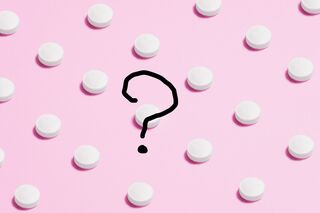Depression
Serotonin Imbalance Found Not to Be Linked to Depression
New research overturns a long-held understanding of how antidepressants work.
Posted July 22, 2022 Reviewed by Davia Sills
Key points
- New research, reviewing huge bodies of scientific evidence, found no direct link between serotonin and depression.
- Depression is therefore not just the result of having too little serotonin, but may be related to more complex brain chemistry.
- Antidepressants, including SSRIs, remain an effective treatment. We just need to better understand why and how they work.
- Recent theory suggests antidepressants might have more important effects on neuroplasticity than just serotonin levels.

Depression, we are commonly taught, is the result of a “chemical imbalance”: having lower levels of the neurotransmitter serotonin than the person needs. Depressed people have less serotonin than they need and so will be helped by taking Selective Serotonin Reuptake Inhibitors (SSRIs), the most popular type of antidepressant medication.
A review of randomized controlled trials, the most reliable type of study for making causal claims in medical research, concluded that SSRIs did significantly reduce the risk for depression. This was based on pooled data from over 2,000 people. A new study suggests this simple story is wrong.
A new, large-scale review of studies linking serotonin and depression was recently published in the journal Molecular Psychology. The study examines evidence from previous reviews and meta-analyses—in other words, it summarizes and combines evidence from all existing studies, including previous reviews. The results are surprising. The authors find “no consistent evidence of there being an association between serotonin and depression or that depression is caused by lowered serotonin activity or concentrations.”
This conclusion was drawn after looking at multiple branches of serotonin research, spanning hundreds of thousands of people. These branches of research differed in quality. The genetic studies reviewed include large samples and were of high quality. This means we have enough evidence to effectively rule out a link between genetic influences on the serotonin system and depression, including the possibility that this link only appears if people experience major stress. Serotonin genes aren’t linked to depression.
Other branches of research led to the overall conclusion of no link but were not as strong. They sometimes left open questions to further research. For example, 19 studies found no evidence of a link between serotonin levels (which can be measured in blood, plasma, urine, and cerebrospinal fluid) and depression. One meta-analysis of postmenopausal women with depression found a small but non-significant effect that people who have used antidepressants previously—regardless of depression levels—had lower serotonin levels.
There was also some inconsistent evidence from studies that changed what people ate or drank in a way that is thought to reduce the production of serotonin downstream. The idea here is that if the chemical imbalance theory is true, reducing serotonin through diet should lead to a depressed mood. (One of the ways this is done is through a “tryptophan depletion” drink, which appears to lower serotonin levels in the brain.) Most studies using this method found no relationship between serotonin reduction and mood, although a few smaller studies suggest slightly more depressed mood in participants who changed their diets. These studies have some lingering problems, however, as the tryptophan depletion drink appears to have several effects on the brain—meaning we can’t know for sure that it’s the lowered serotonin levels that led to any changes. Some studies also included people who had been on antidepressants before, which might have changed the way the serotonin system responded to the drink.
Two meta-analyses looked at the activity of serotonin receptors. Results of these studies suggested either that there was no difference in serotonin receptors between people with and without depression or, in some studies, that depressed people had slightly higher levels of serotonin activity. Again, however, these results might have been affected by including people who had used antidepressants previously. All in all, this was a comprehensive review of what research tells us about serotonin and depression, and it suggests that depression isn’t just about having low levels of serotonin. (For another recent take on this study, see this Psychology Today piece.)

Does this mean antidepressants don’t work?
No. The current best evidence says that antidepressants, including SSRIs, do work to treat people who have depression. This study isn’t a reason to stop taking antidepressants. Instead, it suggests that we don’t understand how antidepressants work as well as we thought.
SSRI medications operate on neurons, which communicate via neurotransmitters. Serotonin is one of these neurotransmitters, which is released by a neuron and then travels to and binds to other neurons. After serotonin has been released by one cell and then communicated with another cell, it gets taken back up to await the next time it needs to be released. SSRIs block that reuptake, meaning the serotonin stays floating between cells for longer and potentially relays its message multiple times before being taken back up.
We know that SSRIs improve depression, and we know that one thing SSRIs do is allow serotonin receptors to be stimulated more often. So a simple model of depression would suggest that depressed people just don’t have enough serotonin. Maybe the reason SSRIs work is that they increase serotonin levels when they are too low. This is a reasonable first hypothesis about how depression works. The new review, however, suggests that this simple explanation isn’t right. When you measure people’s serotonin levels, it doesn’t tell you whether they are depressed or not.

The authors of the new study also raise a counterintuitive possibility: In the long term, SSRIs might actually reduce serotonin levels in the brain. This would be due to the brain—which is plastic and can change over time—adjusting to the presence of the SSRIs. Some studies have found that people who take SSRIs over a long period of time actually have lower levels of serotonin, suggesting that taking the medication might lead the brain to produce less serotonin naturally. Taking this into account would mean developing an explanation for how antidepressants work that operates on two different time scales. In the short term, they might increase serotonin levels. Longer term, they might reduce them.
So why do antidepressants work?
The next logical question to ask is why antidepressants do seem to work. The frequently taught “chemical imbalance” model—at least where serotonin is concerned—may not be true. Serotonin is not just a “depression chemical” but may be involved in more complicated systems or reactions. Or, antidepressants might work by changing other aspects of brain chemistry.
One recent article argues that the fact that antidepressants typically take approximately two weeks to start working means their most important effects might be in changing neuroplasticity—that is, altering the way the brain functions over time. They cite some evidence that SSRIs may increase neuroplasticity or cause stress to have less harmful effects on neuroplasticity. These sorts of alternative explanations should be taken more seriously now, as scientists move to a deeper understanding of what does—and doesn’t—cause depression.
References
Moncrieff J, Cooper RE, Stockmann T, Amendola S, Hengartner MP, and Horowitz, MA. (7.20.2022). “The Serotonin Theory of Depression: A Systematic Umbrella Review of the Evidence.” Molecular Psychiatry. DOI 10.1038/s41380-022-01661-0
Harmer, C. J., Duman, R. S., & Cowen, P. J. (2017). How do antidepressants work? New perspectives for refining future treatment approaches. The Lancet Psychiatry, 4(5), 409-418.




